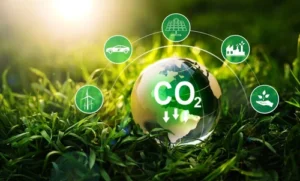GS3 – Environment

Context:
The European Union’s Carbon Border Adjustment Mechanism (CBAM)—a carbon tax on imports—has sparked backlash from BRICS nations, who see it as discriminatory and unfair.
What is CBAM?
- A carbon border tax imposed by the EU on imports from countries with higher carbon emissions than EU industries.
- Set to become operational in 2026.
- Initially applies to carbon-intensive goods such as:
- Iron and steel
- Cement
- Aluminium
- Fertilisers
- Electricity
- The aim is to encourage cleaner production practices globally.
- Exporters from countries with comparable carbon pricing mechanisms to the EU can avoid paying for CBAM certificates.
Why Is It Controversial?
- Equity concerns: Developing countries, especially BRICS, argue the policy imposes disproportionate trade burdens on them and acts as a unilateral protectionist measure.
- Trade rules: While the EU claims compliance with WTO rules, others argue it constitutes non-tariff barriers.
- Climate justice: Critics contend CBAM contradicts the Paris Agreement’s principle of Common but Differentiated Responsibilities (CBDR).
- Difference from Carbon Markets:
- Carbon Markets (Paris Agreement – Article 6.2) involve trading carbon credits.
- CBAM is a direct tax on the carbon footprint of imported goods.




